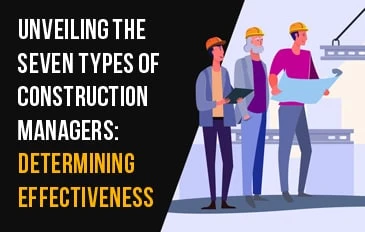Unveiling the Seven Types of Construction Managers: Determining Effectiveness

Unveiling the Seven Types of Construction Managers: Determining Effectiveness
Construction projects require effective management to ensure successful outcomes. Within the construction industry, there are various types of construction managers, each with their unique skills and expertise. In this blog post, we will explore the seven types of construction managers, examining their roles, responsibilities, and key characteristics. Additionally, we will discuss how to determine the effectiveness of a construction manager based on project requirements, team dynamics, and specific project goals.
- General Contractor: The general contractor oversees the overall construction project, responsible for coordinating various subcontractors, managing timelines, and ensuring compliance with regulations. They possess broad knowledge of all construction aspects, including design, procurement, scheduling, and budgeting. An effective general contractor excels at project coordination, communication, and problem-solving, ensuring the smooth execution of the entire project.
- Construction Manager at Risk: Construction Managers at Risk (CMAR) are involved in the project from the early planning stages. They provide input on design, constructability, and cost estimation. A CMAR assumes the risk of the project’s budget and schedule, committing to deliver the project within the agreed-upon parameters. An effective CMAR possesses strong negotiation skills, project management expertise, and the ability to manage project risks effectively.
- Construction Manager as Advisor: Construction Managers as Advisors (CMA) provide expert advice and guidance throughout the construction process. They support the owner in selecting contractors, reviewing project plans, and monitoring construction progress. An effective CMA has extensive knowledge of construction practices, excellent communication skills, and the ability to provide valuable insights and recommendations to the owner.
- Design-Build Manager: Design-Build Managers oversee projects that utilize the design-build delivery method. They are responsible for managing the collaboration between the design and construction teams, ensuring seamless integration and efficient project delivery. An effective Design-Build Manager possesses a strong understanding of both design and construction principles, exceptional communication skills, and the ability to manage interdisciplinary teams effectively.
- Project Manager: Project Managers are responsible for overseeing specific construction projects, managing timelines, budgets, and resources. They coordinate subcontractors, ensure compliance with safety regulations, and monitor project progress. An effective Project Manager possesses excellent organizational skills, leadership capabilities, and the ability to multitask while maintaining a strong focus on project objectives.
- Field Operations Manager: Field Operations Managers are responsible for on-site management and coordination. They oversee construction activities, manage labor and equipment, and ensure adherence to safety protocols. An effective Field Operations Manager has strong problem-solving skills, the ability to manage a diverse workforce, and a keen eye for quality control and safety measures.
- Sustainable Construction Manager: Sustainable Construction Managers specialize in environmentally friendly construction practices. They ensure compliance with green building standards, identify sustainable materials and technologies, and implement strategies to minimize the project’s environmental impact. An effective Sustainable Construction Manager possesses a deep understanding of sustainable practices, knowledge of green certifications, and the ability to integrate sustainable principles into the project’s design and construction phases.
Determining Effectiveness: To determine the effectiveness of a construction manager, several factors should be considered. These include the manager’s experience, expertise in the specific project type, track record of successful project completions, communication skills, ability to manage resources effectively, and leadership capabilities. Assessing their problem-solving abilities, decision-making skills, and aptitude for managing project risks are also crucial.
Additionally, evaluating their ability to foster collaboration, maintain effective communication channels, and build strong relationships with stakeholders is essential. Client testimonials, references, and feedback from team members can provide valuable insights into a construction manager’s effectiveness.
Michael DeSafey is a leading executive recruiter for professionals in the construction, engineering, and environmental industries. He is currently the President of Webuild Staffing: www.webuildstaffing.com. To learn more about Michael, or to follow his blog, please visit www.michaeldesafey.com.
